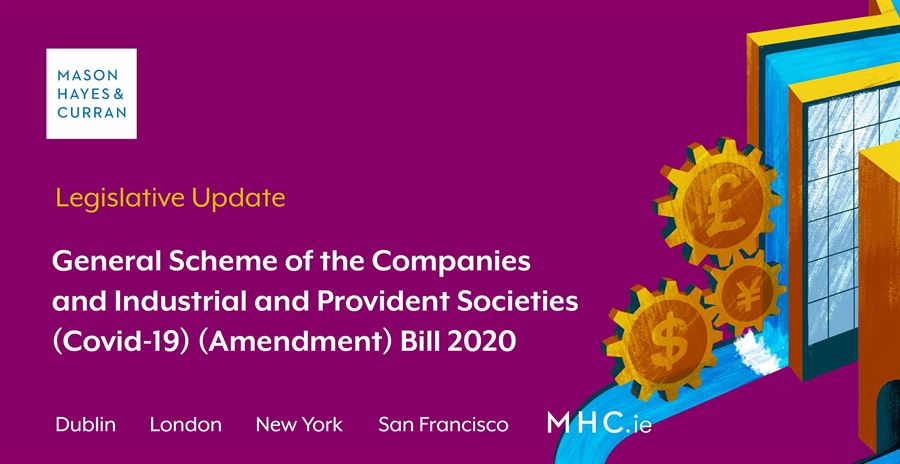
The Irish Government has published the General Scheme of a Bill and related secondary legislation to address practical issues that have arisen for companies and cooperative societies as a result of the Covid-19 pandemic. We examine the scope of the measures and next steps for entities that can avail of its provisions.
Duration of proposed temporary measures
The Bill is expected shortly, and subject to its being enacted, will provide for a series of temporary measures. They will remain in force for 2020 with a possibility of extension, but no later than 30 June 2021. This is similar to the possibility of extension of the application of other emergency Covid-19-related legislation passed earlier in the year.
 Principal changes
Principal changes
-
Companies and cooperative societies will have until the end of 2020 to hold their annual general meetings, instead of within the timeframe required under the law, e.g. nine months from year-end for companies.
-
Companies will be explicitly enabled to convene and hold general meetings – AGMs or EGMs – by virtual means including Zoom, WebEx, Microsoft Teams or other meeting or audience participation software. These meetings can already be convened in certain circumstances but this law will have general application and will deal with technical issues such as notice, quorum and voting.
-
The key elements will be:
-
The top table must broadcast in audio visual mode
-
Participants must be able to receive in audio visual mode or audio mode
-
Participants must be able to ask questions or make comments by audio mode or, if the technology doesn’t allow it, by messaging or other audience participation software
-
-
There are a few other technical amendments dealing with advance notice of rescheduling of meetings (rather than by way of meeting and adjourning) and withdrawal of dividend resolutions.
-
In the same way, creditors’ meetings to commence a winding up and during a winding up will be able to be held by virtual means.
-
In recognition of the cash flow difficulties being faced by certain companies, the amount claimed by a creditor to initiate a creditors’ voluntary winding up is to be increased to €50,000. This is up from the current levels of €10,000 for a single creditor and €20,000 for creditors acting together.
-
In light of the practical difficulties to put rescue finance in place for companies in examinership, the Court is to be given power to extend an examinership by up to 50 days beyond the current 100 day limit.
-
The duty of directors to have regard to the interest of creditors where a company is insolvent or is approaching insolvency, already a common law duty, is to become a statutory duty.
-
The requirement where the employer is in liquidation to get leave of the High Court to bring proceedings in the Workplace Relations Commission is to be removed.
Director liability
Proposals advanced by certain organisations for relief for directors from the risk of restriction or imposition of personal liability for reckless trading during the pandemic are not reflected in the Bill. This is likely to be due to a position that the statement issued on 4 June 2020 by the Office of the Director of Corporate (ODCE) “Enforcement Covid-19 and the insolvency-related functions of the ODCE” provides adequate reassurance that directors will not suffer sanctions without just cause.
Conclusion
These proposals, once enacted, will in particular provide assurance to companies when organising their AGMs. Companies will be given some extra time to hold their AGMs and a company will be explicitly authorised to hold any general meeting on an electronic platform, notwithstanding the provisions of the company’s constitution.
For more information on the impact of the Bill’s changes on governance and their eventual enactment, contact a member of our Corporate Governance & Compliance team.
For more information on the impact of the Bill’s changes on insolvency procedures, contact a member of our Restructuring & Insolvency team.
The content of this article is provided for information purposes only and does not constitute legal or other advice.






